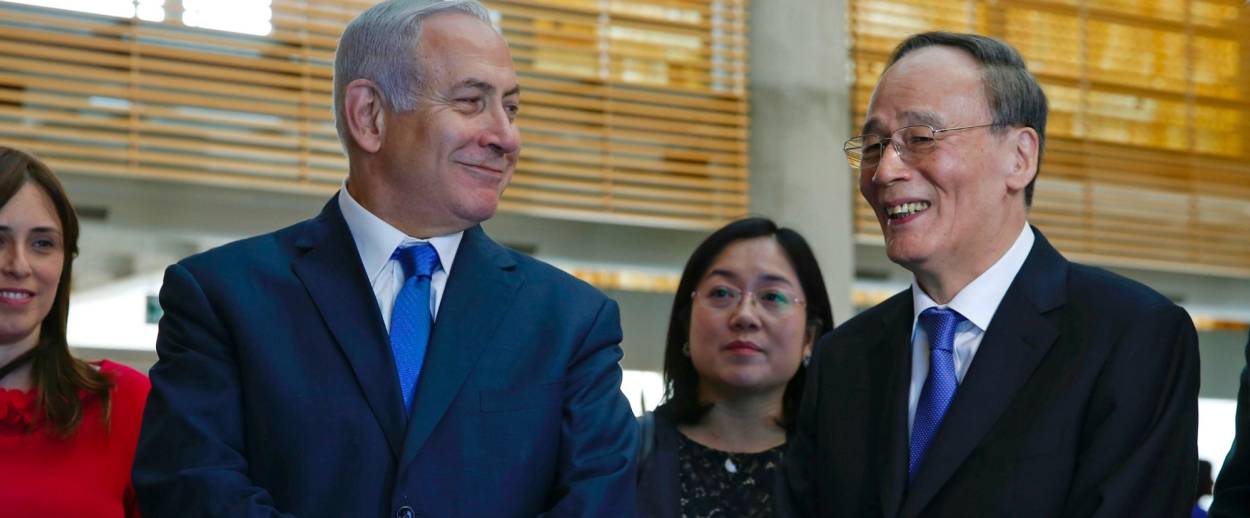Chinese Capital in the Startup Nation
Will increased tech and trade cooperation with China upset Israel’s critical alliance with the U.S.?




China’s Vice President Wang Qishan visited Israel this week, becoming the most senior Chinese leader to visit Israel in nearly two decades.
And while Israeli officials justly feted the second most powerful man from the world’s second-largest economy, Wang’s reason for coming to Israel can be found in the identity of three other prominent guests this week in Israel. These three guests–Jack Ma, Steve Mnuchin, and the General Assembly of the Jewish Federations of North America (JFNA)–capture the vast opportunity and risks Israel confronts in growing closer to China.
Vice President Wang was accompanied to Israel by Jack Ma. As the founder and chairman of Alibaba, a Chinese e-commerce retailer often compared to Amazon.com, Ma is China’s preeminent technology leader. This week marks Ma’s second visit to Israel in the last six months. Like hundreds of other Chinese companies and localities, Alibaba has become a regular visitor in recent years to the Middle East’s Startup Nation.
Technology has always been the calling card of Sino-Israeli ties. But unlike in the 1990s, when military technology drew Chinese to Israel, Ma and his peers today arrive targeting commercial technologies like artificial intelligence, autonomous driving, and digital health.
Of course, these Israeli technologies attract investors from around the world. What makes Chinese capital stand out is that it is generally strategic rather than financial. In China’s last two five-year plans (2011-2015 and 2016-2020), the government has expressly encouraged domestic companies to invest in overseas technology. Alibaba and other companies have responded–and Israel’s standout tech sector has benefited from the influx of Chinese capital.
Up to a point. Chinese investment in Israel topped out in 2017 at nearly $600 million. At only 1.1 percent of the total deal flow in Israel, China’s share remains negligible. Given that China’s global investments in 2017 totaled $160 billion, Israel’s share is also negligible. The silver lining is that there is vast potential for growth. The extent to which that potential is realized will largely be shaped by the second prominent visitor to Israel this week, U.S. Treasury Secretary Steven Mnuchin.
Mnuchin’s presence in Israel alongside the vice president was coincidental. But the U.S. influence on Sino-Israeli relations has never been coincidental. In the 1950s, Israel refrained from forming ties with China due to U.S. opposition. In the early 2000s, U.S. pressure forced Israel to cancel several major arms deals with China. In the last decade, Sino-Israeli ties have flourished in no small part due to the friction between former U.S. President Obama and Prime Minister Netanyahu, and more broadly, the nonconfrontational approach to China favored by Obama and his Republican predecessor. In the absence of U.S.-China tension, Netanyahu was free to pursue closer ties with Beijing, a relationship Israel’s right-wing government appreciates given China’s disinterest in the peace process.
Led by Mnuchin, the Trump administration is now confronting China, motivated by the same Chinese technology agenda that is driving Chinese investors like Ma to Israel. In contrast to the warm welcome for Chinese money in Israel, the Trump administration is tightening restrictions on Chinese international investment in technology–not only in the U.S., but also by encouraging allied countries to establish stricter regulations on Chinese investment.
Netanyahu faces a difficult test to balance these competing prerogatives. On the one hand, the Israeli government is taking steps to set up an agency to monitor international investments. At the same time, Israel is actively welcoming the potential for greater Chinese investment that can result from other technology markets closing their doors to China.
Israel’s record in balancing the dueling interests of the U.S. and China is not encouraging. The first era of Sino-Israel ties came crashing to a halt in 2000 over U.S. opposition to a signature weapons deal. While U.S. pressure forced the issue, Israel failed to maintain any degree of discretion, leading the Clinton administration to intervene. An opposite case occurred in 2013 when Netanyahu favored Chinese financial interests over the U.S. justice system, ignoring American-Jewish plaintiffs that launched the lawsuit against Chinese complicity in financial terrorism.
The American pro-Israel community also largely ignored the 2013 lawsuit. But Chinese leaders, keenly interested in the support Israel receives from the American Jewish diaspora, paid closer attention. With the JFNA holding their annual conference in Israel this week, Chinese leaders were given further insight into the influence of the American Jewish diaspora. Whereas in the past Beijing viewed relations with Jerusalem as a means of leveraging Jewish community influence in Washington, today a more confident China reference Israel/diaspora relations as a role model for China’s ties with its own global diasporas.
Jack Ma traveled with the Chinese Vice President on his visit. Mnuchin and the JFNA delegates did not even meet the Chinese delegation. But for China, the issues each visitor represents—technology, the United States, and fostering global influence through the diaspora—is what is motivating China to deepen ties with Israel. Whether Israel can repair the benefits and avoid the risk if those ties remains an open question.
Sam Chester is an expert on China-Middle East affairs, managing technology funds for investors in China, Europe and the Middle East.